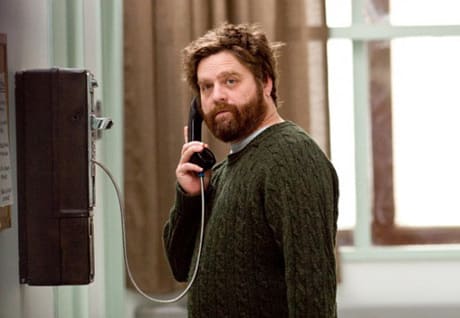A more appropriate title for It's Kind of a Funny Story would be It's Kind of a Patronizing Bohemian Hippie Story, given its glib, insulting message of perspective (without having any of its own) and freedom from bureaucratic social pressures through art.
This isn't a big surprise, since Boden and Fleck's previous entries (Half Nelson and Sugar) leaned towards preachy, but at least demonstrated some maturity, grace and distance, respecting the audience enough to interpret situations and issues through their own lexicon of signifiers. Their latest "comic" entry is flat out smug.
Mixing contemplative melodrama (injected with unintentionally amusing platitudes and Bob Dylan lyrics) with quirky, Scrubs-like fantasy sequences and jokes about beavers, It's Kind of a Funny Story finds depressive teen Craig (Keir Gilchrist) checking himself into psychiatric ward while contemplating suicide. Like the similarly themed, but superior, Girl, Interrupted, he immediately engages in a series of bizarre encounters with schizophrenics and sociopaths that all seem to have a heart of gold, despite occasionally twitching and yelling profanities.
When not chatting with omniscient Dr. Minerva (Viola Davis), Craig flirts with depressive cutter Noelle (Emma Roberts) and learns valuable life lessons from the paternal, conflicted Bobby (Zach Galifianakis). Every once in awhile a fantasy sequence or flashback will break things up via protracted lip-synching sessions of "Under Pressure" or dinnertime projectile vomiting. Essentially, it's cute, playful and packaged, much like an HBO pilot.
And while this initially harmless setup has some powerful and amusing moments, despite some awkwardness in maintaining a consistent tone between fantasy and reality, the film eventually devolves into a communist, bohemian diatribe that insults most of its audience.
As Craig explores his depression with the group of surprisingly sociable and affable psychopaths in his mental ward, he learns that his anxieties stem from social pressures, such as getting into a good business school, earning money and living the dream. Ignorantly resolving his plight through the miracle of crappy post-modernist art and flipping the bird to corporate banality ― ignoring the later life implications of such a decision ― the film proceeds to "cure" this confused teenager by pointing out that other people are worse off.
While assumedly, Boden and Fleck genuinely feel that people don't deserve to be depressed when there are starving kids in Africa, or whatever, offering this "perspective" to a teenager suffering an existential crisis would have very different results than the pat, uplifting horseshit on display in this movie.
Regardless of being occasionally funny and easy to watch, this film is a wolf in sheep's clothing, force-feeding its bias down the throats of viewers sucked in by the peppy, pretty surface.
(Alliance)This isn't a big surprise, since Boden and Fleck's previous entries (Half Nelson and Sugar) leaned towards preachy, but at least demonstrated some maturity, grace and distance, respecting the audience enough to interpret situations and issues through their own lexicon of signifiers. Their latest "comic" entry is flat out smug.
Mixing contemplative melodrama (injected with unintentionally amusing platitudes and Bob Dylan lyrics) with quirky, Scrubs-like fantasy sequences and jokes about beavers, It's Kind of a Funny Story finds depressive teen Craig (Keir Gilchrist) checking himself into psychiatric ward while contemplating suicide. Like the similarly themed, but superior, Girl, Interrupted, he immediately engages in a series of bizarre encounters with schizophrenics and sociopaths that all seem to have a heart of gold, despite occasionally twitching and yelling profanities.
When not chatting with omniscient Dr. Minerva (Viola Davis), Craig flirts with depressive cutter Noelle (Emma Roberts) and learns valuable life lessons from the paternal, conflicted Bobby (Zach Galifianakis). Every once in awhile a fantasy sequence or flashback will break things up via protracted lip-synching sessions of "Under Pressure" or dinnertime projectile vomiting. Essentially, it's cute, playful and packaged, much like an HBO pilot.
And while this initially harmless setup has some powerful and amusing moments, despite some awkwardness in maintaining a consistent tone between fantasy and reality, the film eventually devolves into a communist, bohemian diatribe that insults most of its audience.
As Craig explores his depression with the group of surprisingly sociable and affable psychopaths in his mental ward, he learns that his anxieties stem from social pressures, such as getting into a good business school, earning money and living the dream. Ignorantly resolving his plight through the miracle of crappy post-modernist art and flipping the bird to corporate banality ― ignoring the later life implications of such a decision ― the film proceeds to "cure" this confused teenager by pointing out that other people are worse off.
While assumedly, Boden and Fleck genuinely feel that people don't deserve to be depressed when there are starving kids in Africa, or whatever, offering this "perspective" to a teenager suffering an existential crisis would have very different results than the pat, uplifting horseshit on display in this movie.
Regardless of being occasionally funny and easy to watch, this film is a wolf in sheep's clothing, force-feeding its bias down the throats of viewers sucked in by the peppy, pretty surface.
